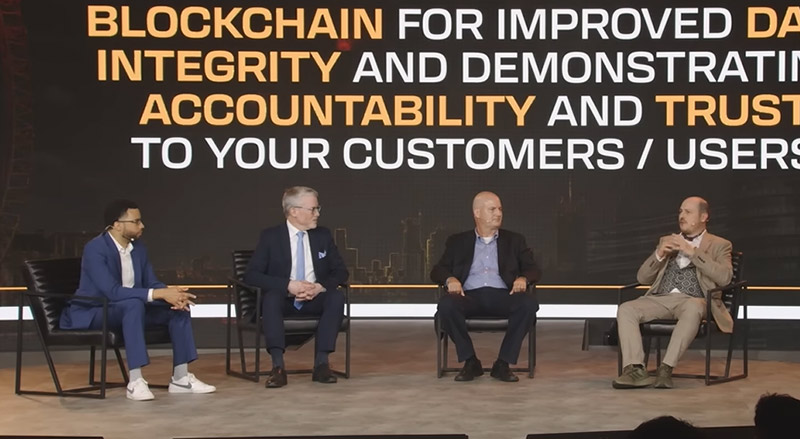Telling stories with data has become a compelling means to convey complex information, and at the heart of this evolution lies the revolutionary technology of blockchain. As businesses grapple with the challenges of maintaining data integrity, and accountability and fostering trust among customers and users, blockchain emerges as a transformative force.
By seamlessly weaving together the threads of transparency, security, and decentralisation, blockchain not only enhances the reliability of data but also provides a powerful narrative that reassures stakeholders of an organisation’s commitment to honesty and trustworthiness.
This was discussed during a recent panel discussion which was hosted by Joshua Henslee and included:
- Stephan Nilsson (CEO and co-founder of UNISOT);
- Chris Light (CEO and founder of E-Livestock Global LLC);
- Shem Booth-Spain (Co-founder and CEO of Blarecast Systems).
Telling a story with blockchain
Nilsson began the panel by discussing how UNISOT is tracking the seafood supply chain on the BSV blockchain. ‘You have a lot of data but they are all enclosed in data silos in every single company. Then you need to build integrations between them to exchange information,’ he said.
While this may have worked 10 or 15 years ago, the digital economy has now reached a point where companies are constantly changing suppliers and sources, leading to rising demand about exactly where our food is coming from. ‘We can prove the quality of products. We can prove that the products are sustainable, prove where they’re coming from,’ he said.
This tracking and tracing of data allows UNISOT to tell a story of a product’s journey from source to the table, allowing customers and businesses to figure out the exact provenance of an item.
Using blockchain from farm to table
Light is using the BSV blockchain in a similar way to track and surface data around livestock. He noted that many farms today are still paper-based, making it difficult to ensure the welfare of livestock. He highlighted a recent case where a farmer who recently audited his livestock found out that he had thousands fewer cows than he previously had on the books.
Transforming this data into a narrative has the potential to yield significant advantages for businesses and entire industries, he explained. Light added that in nations facing financial instability or dealing with volatile currencies, numerous farmers opt to store their wealth within their businesses instead of relying on traditional banking or keeping cash in a mattress. Consequently, accessing and utilising this stored wealth can pose challenges, placing farmers in a challenging position during price negotiations.
Crypto-assets, blockchain and a different type of story
Not all stories around blockchain are positive and the panel discussion also considered the impact of ‘crypto’ and how it is often conflated with blockchain. Booth-Spain noted that it is quite common to sit down with someone to talk about blockchain and realise that they are talking about crypto.
‘There’s a big need out there for these solutions, but we still have problems. We need to reeducate customers, and talking about that, we have the blockchain technology and not the crypto craze or the NFT craze. We have a system that works and scales’, added Nilsson.
